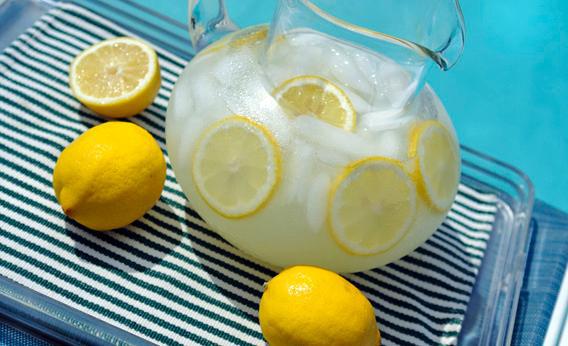A heat wave has many people in the eastern United States reaching for cold beverages such as lemonade and citrus-flavored soda. American settlers used to cool off with vinegar water. Why are sour drinks associated with refreshment?
Because they stimulate salivation. When you start to become dehydrated on a hot day, your body’s need for liquid manifests as a dry mouth. Research out of Japan in the 1960s showed that sour flavors stimulate salivation more than any other taste. Acidic drinks wet the mouth and give the impression of hydration even after your lemonade or vinegar water is finished.
Acidity also masks less refreshing flavors. Coca-Cola, another popular summer beverage, has a whopping 39 grams of sugar per serving. Those calories provide an energy boost on a hot day, but experiments suggest that sweetness is among the least refreshing flavors. Chilling the beverage to near-freezing temperatures and carbonating it help cover the sweetness, but it’s the acidity that makes cola palatable. The pH of Coca-Cola is approximately equivalent to that of vinegar. To fully experience how much acidity is required to offset high sugar contents, try chewing a piece of gum containing gymnemic acid, which binds to the sweetness receptors on your taste buds and blocks your perception of sugar. Then drink an acidic beverage. Your lemonade or cola will taste uncomfortably sour.
Conditioning is at play as well; we’ve learned to associate acidity with refreshment. Cleansers and air fresheners reek of lemon, and we probably make the connection between the clean smell in our dish soap and the flavor in our foods. Celebrity chef Mario Batali likes to refer to acid flavors as “bright,” and other cookbook authors use “fresh,” “perky,” and a range of other adjectives suggesting refreshment to describe the flavor of lemons. In 1975 taste researcher Howard Moskowitz showed that subjects from different cultures prefer vastly different levels of sourness, even though the preference for salt and sweetness is more universal, suggesting that our interest in sourness is largely learned.
We don’t seem to find acid refreshing in all forms and contexts. A 1998 study, for example, suggested that consumers find acidic beers less thirst-quenching. (Carbonation was the main driver of a beer’s refreshment level in the study.) It’s not entirely clear why the acid in beer failed to refresh, but it may have to do with how the researchers manipulated the acid levels. Vinnie Cilurzo, founder of Russian River Brewing Co., which makes some of America’s most popular sour beers, insists that simply adding acid directly to a beer creates “harsh” and “medicinal” flavors. Allowing bacteria to sour a beer naturally makes a smoother and more refreshing brew.
Got a question about today’s news? Ask the Explainer.
Explainer thanks Tom Finger of the University of Colorado, John Hayes of Penn State University, and David Labbe of Nestlé.
